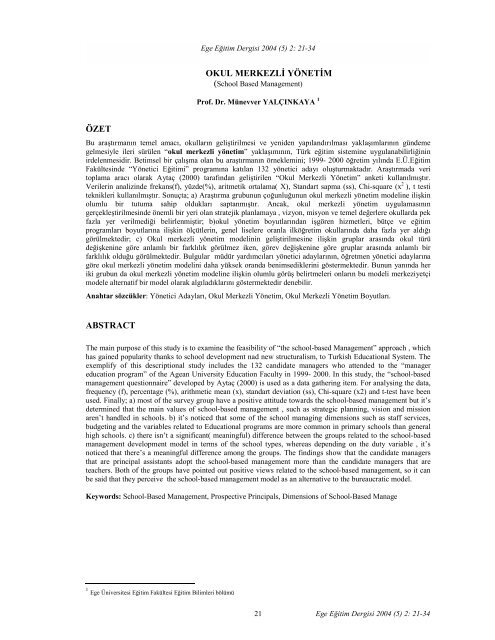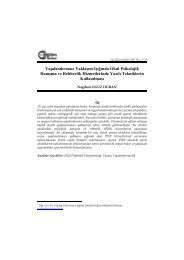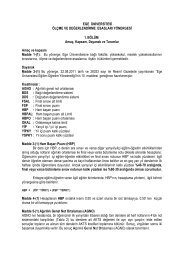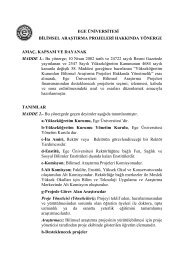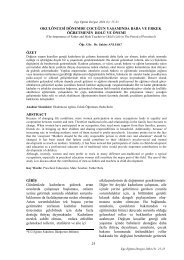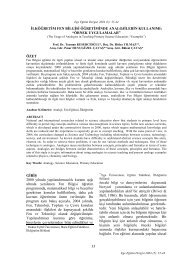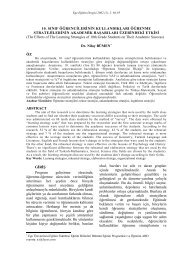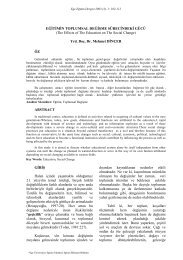EGE EĞİTİM DERGİSİ - Eğitim Fakültesi - Ege Üniversitesi
EGE EĞİTİM DERGİSİ - Eğitim Fakültesi - Ege Üniversitesi
EGE EĞİTİM DERGİSİ - Eğitim Fakültesi - Ege Üniversitesi
You also want an ePaper? Increase the reach of your titles
YUMPU automatically turns print PDFs into web optimized ePapers that Google loves.
<strong>Ege</strong> <strong>Eğitim</strong> Okul Dergisi Merkezli 2004 Yönetim (5) 2: 21-34<br />
OKUL MERKEZLİ YÖNETİM<br />
(School Based Management)<br />
Prof. Dr. Münevver YALÇINKAYA 1<br />
ÖZET<br />
Bu araştırmanın temel amacı, okulların geliştirilmesi ve yeniden yapılandırılması yaklaşımlarının gündeme<br />
gelmesiyle ileri sürülen “okul merkezli yönetim” yaklaşımının, Türk eğitim sistemine uygulanabilirliğinin<br />
irdelenmesidir. Betimsel bir çalışma olan bu araştırmanın örneklemini; 1999- 2000 öğretim yılında E.Ü.<strong>Eğitim</strong><br />
<strong>Fakültesi</strong>nde “Yönetici <strong>Eğitim</strong>i” programına katılan 132 yönetici adayı oluşturmaktadır. Araştırmada veri<br />
toplama aracı olarak Aytaç (2000) tarafından geliştirilen “Okul Merkezli Yönetim” anketi kullanılmıştır.<br />
Verilerin analizinde frekans(f), yüzde(%), aritmetik ortalama( X), Standart sapma (ss), Chi-square (x 2 ), t testi<br />
teknikleri kullanılmıştır. Sonuçta; a) Araştırma grubunun çoğunluğunun okul merkezli yönetim modeline ilişkin<br />
olumlu bir tutuma sahip oldukları saptanmıştır. Ancak, okul merkezli yönetim uygulamasının<br />
gerçekleştirilmesinde önemli bir yeri olan stratejik planlamaya , vizyon, misyon ve temel değerlere okullarda pek<br />
fazla yer verilmediği belirlenmiştir; b)okul yönetim boyutlarından işgören hizmetleri, bütçe ve eğitim<br />
programları boyutlarına ilişkin ölçütlerin, genel liselere oranla ilköğretim okullarında daha fazla yer aldığı<br />
görülmektedir; c) Okul merkezli yönetim modelinin geliştirilmesine ilişkin gruplar arasında okul türü<br />
değişkenine göre anlamlı bir farklılık görülmez iken, görev değişkenine göre gruplar arasında anlamlı bir<br />
farklılık olduğu görülmektedir. Bulgular müdür yardımcıları yönetici adaylarının, öğretmen yönetici adaylarına<br />
göre okul merkezli yönetim modelini daha yüksek oranda benimsediklerini göstermektedir. Bunun yanında her<br />
iki grubun da okul merkezli yönetim modeline ilişkin olumlu görüş belirtmeleri onların bu modeli merkeziyetçi<br />
modele alternatif bir model olarak algıladıklarını göstermektedir denebilir.<br />
Anahtar sözcükler: Yönetici Adayları, Okul Merkezli Yönetim, Okul Merkezli Yönetim Boyutları.<br />
ABSTRACT<br />
The main purpose of this study is to examine the feasibility of “the school-based Management” approach , which<br />
has gained popularity thanks to school development nad new structuralism, to Turkish Educational System. The<br />
exemplify of this descriptional study includes the 132 candidate managers who attended to the “manager<br />
education program” of the Agean University Education Faculty in 1999- 2000. In this study, the “school-based<br />
management questionnaire” developed by Aytaç (2000) is used as a data gathering item. For analysing the data,<br />
frequency (f), percentage (%), arithmetic mean (x), standart deviation (ss), Chi-square (x2) and t-test have been<br />
used. Finally; a) most of the survey group have a positive attitude towards the school-based management but it’s<br />
determined that the main values of school-based management , such as strategic planning, vision and mission<br />
aren’t handled in schools. b) it’s noticed that some of the school managing dimensions such as staff services,<br />
budgeting and the variables related to Educational programs are more common in primary schools than general<br />
high schools. c) there isn’t a significant( meaningful) difference between the groups related to the school-based<br />
management development model in terms of the school types, whereas depending on the duty variable , it’s<br />
noticed that there’s a meaningful difference among the groups. The findings show that the candidate managers<br />
that are principal assistants adopt the school-based management more than the candidate managers that are<br />
teachers. Both of the groups have pointed out positive views related to the school-based management, so it can<br />
be said that they perceive the school-based management model as an alternative to the bureaucratic model.<br />
Keywords: School-Based Management, Prospective Principals, Dimensions of School-Based Manage<br />
1 <strong>Ege</strong> <strong>Üniversitesi</strong> <strong>Eğitim</strong> <strong>Fakültesi</strong> <strong>Eğitim</strong> Bilimleri bölümü<br />
21<br />
<strong>Ege</strong> <strong>Eğitim</strong> Dergisi 2004 (5) 2: 21-34


